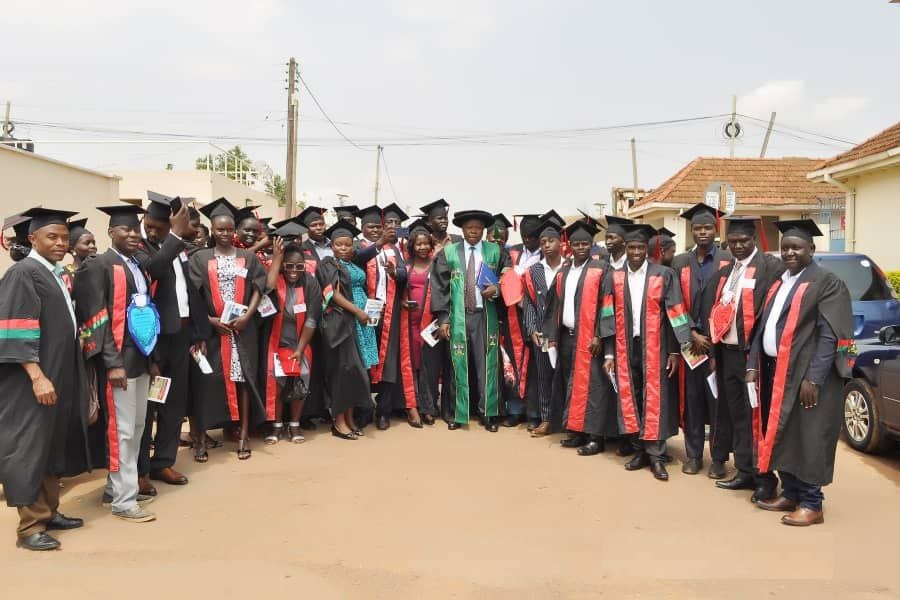MBALE, UGANDA: The Uganda Local Governments Association (ULGA) has commended and thanked Makerere University Council for opening up and gazetting regional branches and centres across the country as a one-stop centre where all University academic courses can be conducted.
The ULGA Vice Chairperson in the eastern region, who is also the Kapchorwa District LCV Chairperson, Mrs Everlyne Kubarika Chebet made these remarks during the graduation ceremony for course finalists at Makerere University’s Mbale branch where over 100 students who completed their studies between April and July 2023 were awarded certificates in administrative law officers course.
Mrs Chebet thanked the various initiatives undertaken by the University to make local governments work better. She said; “By training our staff in areas of law you help to relieve us of many vices that would have been committed due to lack of legal knowledge.
“I now have full confidence that these graduates of today will work much better and become more technical than before,” she added.
Makerere University Mbale branch Coordinator, Mr Steven Masiga presented the graduands for the award of the administrative law certificates to the Guest of honour, majority of whom included employees in the local government employees such Mr Joseph Lobot (Amudat LC5 Chairperson), the District returning officer Napak, the District planner Amudat and the DHO Kapchorwa.
Others were; Kapchorwa Hospital Human Resource Officer, sub-county chiefs, parish chiefs, deputy headteachers, and NGO staff, among other occupations.
Mr Masiga said last year over 200 students were trained and also graduated formally since it is a university policy that all awards must be conducted in a more public manner. He added that another graduation is slated between November and December this year where over 150 students are expected to graduate.
Explaining the rationale of the courses, Masiga said the administrative law skills and qualifications acquired by learners are considered by local governments for entry, confirmation and retention of one,s job either in local government or central government.
He further pointed out the extra benefits associated with the study of short courses where for example; a short course in law fetches an applicant 5 extra marks during interviews at either public service commission or district service commission.
According to him, this means that where there is a draw between applicants for the same job, the focus will shift to extra qualifications possessed by the applicant and this can also fetch a candidate additional marks thereby knocking off his opponent for the job.
He also explained that short courses are very beneficial but also intensive, as they literally consume time and also on account of busy work schedules by learners.
“For example; to study law one must arm himself or herself with the penal code Act, the local government Act, the constitution and the police Act among other statutes,” Masiga said.
Mr Masiga encouraged the graduands to stay away from the vice of cooperate crime and use all legal skills and precedents studied to make the workplace a more crime-free environment. He lamented and bemoaned situations where civil servants have become criminals instead of staying civil as envisaged by the law but said that knowledge can cure such ills.
Dr Mugula Oscar who represented the Principal College of Education and External Studies at Makerere encouraged the graduating students to be immediate contacts of the university in their workplaces. He pledged continuous training on behalf of the vice-chancellor Prof Barnabas Nawangwe, and the College Principal Prof Muggaga Anthony.
Makerere University’s Mbale Study Centre was opened way back in the 1960s on behalf of the government to bring university education deep into communities. Over the years, Government has leaned on Makerere in areas of law and decentralization for a long time.
For example, In 1987 Prof Muhamood Mumdan was hired by Makerere University to extensively brief the government on the country’,’s readiness for decentralization. He gave a very positive report and this explains the current decentralized nature of administration.
The students were grounded in the following specifics of law particularly knowledge of enactment of ordinances in local governments, aspects of criminology and penology, a delegation of power, the structure of the court system in Uganda, the tripartite system of Governance both at the centre and periphery, rule of law, discreet exercise of discretionary powers, vicarious offences, writs issued by the high court, defences in law, all of which are extracted from introduction to law, constitutional law, Administrative law, criminal law among other units taught.
Currently, the University branch in Mbale has numerous programs on its shelve like diplomas in public administration, certificates in public administration, medical records certificates and other selected programs.
In Local governments, over 90% of its parish chiefs were trained by the Mbale Branch of Makerere University as mandated by the Ministry of local government.
The centre has also helped to build the capacity of local government leaders where district councillors have been assessed in areas of legislation and enactment of ordinances among others. Recently we trained NTV Uganda, Daily Monitor and selected radio presenters on responsive media reporting. At the same workshop, several members of Imbalu Committee of Inzu Yamasaaba were also trained
Notable alumni of the Administrative Law Officers course from the Mbale branch include; the District Education Officers for Mbale, Pallisa, Kilak, and Busia among others, a number of RDCs and Returning Officers.
The next intake for the administrative law officers course is slated for August.
If you would like your article/opinion to be published on Uganda’s most authoritative news platform, send your submission on: [email protected]. You can also follow DailyExpress on WhatsApp and on Twitter (X) for realtime updates.



